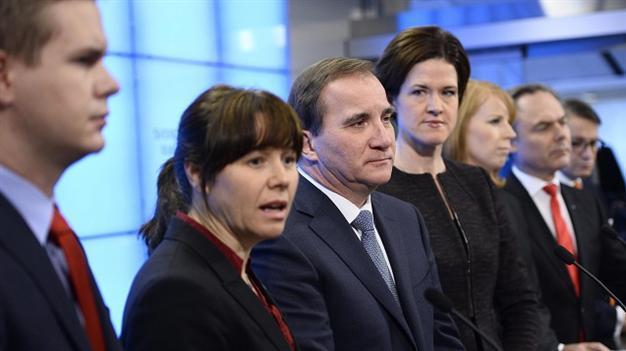Sweden avoids snap poll in deal that counters far right
STOCKHOLM - Agence France-Presse

(L to R) Green Party spokespersons Gustav Fridolin and Asa Romson, Prime Minister Stefan Lofven, Moderate Party leader-elect Anna Kinberg Batra, Centre Party leader Annie Loof, Liberal People's Party leader Jan Bjorklund and Christian Democrat leader Goran Hagglund stand during a news conference at the Swedish Parliament in Stockholm, December 27, 2014. REUTERS/Maja Suslin/TT News Agency
Sweden’s government on Dec. 27 announced a deal with the opposition that will avert the country’s first snap elections in more than half a century and counter the rising influence of the anti-immigrant far right.The deal announced by Prime Minister Stefan Loefven, in office for less than three months, will see the minority centre-left government remain in power. The far right has however threatened a no-confidence vote.
Loefven had called early elections this month after the populist and anti-immigrant Sweden Democrats torpedoed his fledgling government’s budget.
The crisis had dealt a severe blow to Sweden’s self-image as a tolerant nation and illustrated the rising political fortunes of anti-immigrant parties in much of Europe.
"Thanks to the agreement we have found enabling a minority government to govern, the government will not organise early elections," Loefven, a Social Democrat, said.
The Sweden Democrats, which had said they wanted to turn the now-cancelled election into a referendum on immigration, reacted with anger and disappointment to the news of the surprise deal.
"We don’t have any confidence in Loefven as prime minister," said Mattias Karlsson, interim leader of the Sweden Democrats, in an interview with public television SVT.
He said the party will subject Loefven’s government to a vote of no confidence, but did not say when.
The Sweden Democrats -- which won 13 percent of the vote in parliamentary elections held in September -- launched their budget spoiler on December 3 as a protest over the government’s pro-immigration policies.
The Sweden Democrats has grown from a virtual non-entity a decade ago to the country’s third-largest party today, riding a wave of concern among many Swedes about a growing influx of foreigners, especially refugees from countries outside Europe.
"Basically, the idea is to not allow the Sweden Democrats to have any influence," said Camilla Sandstroem, a political scientist at the University of Umeaa in northern Sweden.
The snap poll had been called to take place on March 22. If it had gone ahead, it would have been the first early elections in politically stable Sweden since 1958.
The Dec. 27 announcement of a deal implies that Loefven can continue to rule in a coalition with the Greens, and that that the four-party centre-right opposition, the Alliance, will not oppose the budget in a new vote.
The agreement, which will run until 2022, means that whichever of the six parties are in opposition will commit to not voting against the government’s budget.
"It illustrates a common feature of Swedish politics -- you look for long-term solutions," said Sandstroem from Umeaa University.
"This is a victory for Sweden," said Anne Kinberg Batra, set to take over as leader of the Moderates, the largest opposition party, and widely tipped to one day become the Nordic country’s first female prime minister.
The six parties have agreed to focus on defence, energy and pensions as three areas where left and right in parliament will be able to cooperate in the future.
"Sweden has a proud tradition for solving difficult problems across party boundaries which doesn’t exist in any other country," Loefven said.
















